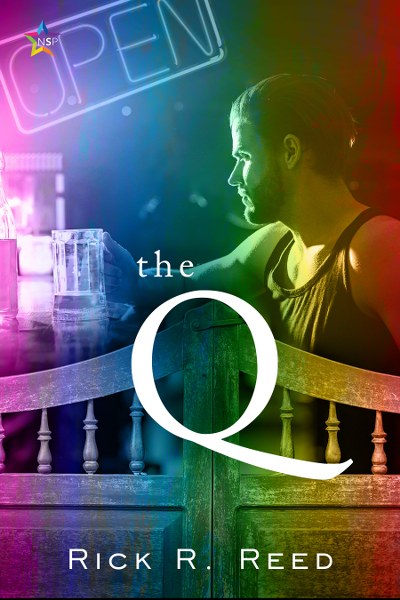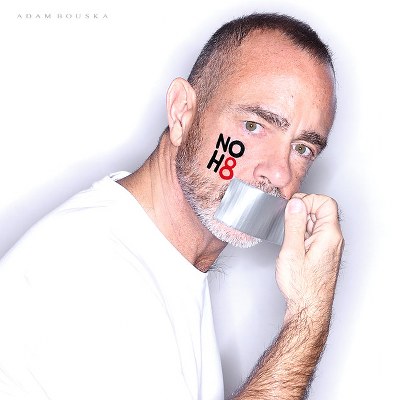EXCERPT
#1 FROM THE Q ©2021 Rick R. Reed
Prologue
The
Quench Room
First, no one ever called it the Quench Room. To its
patrons, it was just the Q. Most of them weren’t even aware of its proper name.
You wouldn’t find it on a sign or in neon. Many—gay, straight, and otherwise inclined—were certain
the Q stood for Queer. Some saw it as
an affirming name, reclaimed from those who’d hurl it to wound. Others
whispered it, snickering, rolling eyes.
Second, unless you knew what you were looking for,
you’d drive right by the Q, not thinking its sad, nondescript exterior housed
much of anything. Lonely and forgotten on a stretch of country road, the Q lay
just outside the blink-and-you’ll-miss-it town of Hopewell, West Virginia.
Housed in a squat, gray cinderblock building, the Q had no front door—patrons
entered through a chipped red-painted back door off the gravel parking lot in
the back. The single window out front, long and rectangular, was black tinted
so passersby couldn’t see inside. For those who came to the Q on the down low,
the tinted glass provided a measure of privacy and security.
The Q’s nearest neighbors were an auto-body shop
called, charmingly, Gomer’s, and, down the road just a bit, a no-name bait and
tackle shop, open only in summers, for those fishing on the nearby Ohio River.
The Q didn’t look like a place where people
celebrated.
It didn’t appear to be an establishment where people
hooked up, hoping for a raunchy one-night stand or dreaming of a lifetime
commitment—and everything in between. A casual glance would never inspire the
idea that the Q was a place for socializing, dancing, and drinking.
No one, driving by, would have imagined that this
one-story building, rising up out of a weed-choked gravel lot, was the origin
of so many love affairs, failed, and, sometimes, rarely, successful. Who would
want to meet their beloved in such a sad, little shack? Why, it didn’t even
possess a tin roof…rusted.
And yet, the Q was the gathering spot for
this little rural area’s LGBTQ+ folks, especially those not inspired enough to
make their way up the river to the bright lights and fancy bars of Pittsburgh.
Pittsburgh, for a lot of the Q’s patrons, might as well have existed on another
planet.
The Q was open only on Thursday, Friday, and
Saturday nights, although Saturday was the busiest. Then, the parking lot was
crowded with pickup trucks and the hulks of various sedans, coupes, and
compacts, mostly older and none even remotely close to luxury vehicles. On
Saturday nights, only the early birds got parking spots in the lot. If you
showed up later, you parked alongside the road and prayed you didn’t get
sideswiped while inside, imbibing and hoping, perhaps, for a special love
connection.
Windows down, people driving by on a Saturday night
might hear strains of muffled music coming out—thumping bass, 1980s disco tunes
going way back to Sylvester and Prince and right up to Lady Gaga and Beyonce,
popular line dances, and even some hardcore rock and roll from the likes of ZZ
Top, Aerosmith, and maybe even Iron Maiden.
The Q’s patrons traveled from the little towns
scattered throughout this poor area in the foothills of the Appalachians. They
came from upriver in Pennsylvania, across the river in Ohio, and, of course,
from right here in the northern panhandle of West Virginia. Driving along
potholed roads in dusky dusk or navy-blue twilights, you might spy the golden
eyes of a fox peeking out from underbrush lining either side of the road.
When you arrived at the Q, though, and stepped
through its red-doored portal of a Saturday night, the contrast was almost
startling. What, outside, was grim and depressing, became magical inside.
Voices murmuring, ice clinking in glasses, fairy lights above the big mirror
behind the bar, the crack of pool balls, laughter, and maybe, Gloria Gaynor
optimistically telling the world she would survive.
And somehow, you knew you would too.
If only for a few hours.
EXCERPT
#2 FROM THE Q ©2021 Rick R. Reed
Nobody
to Love
Nelson
DiCarlo wondered, for the thousandth Saturday night, why he didn’t stay home.
After
all, he had regular cable, Netflix, Hulu, Amazon Prime, and YouTube. He had a
fully-stocked liquor cabinet and could make himself just about any cocktail he
could imagine, from the simple—gin and tonic with a twist of lime—to the
exotic—a Pimm’s Cup with orange and cucumber slices. His pantry was stocked
with chips, cookies, and crackers to go with the cheeses and dips in his
fridge.
His
dog, Homer, a so-ugly-he’s-cute mix of dachshund and poodle, was always ready
to cuddle or take a long walk in the night air. So, he couldn’t say he was
lacking for company. Homer was short on judgment, long on love, and as long as
Nels was paying attention, the dog never got bored. If Nels’s attention did
stray, the dog reeled him back in by covering his faces with kisses.
No,
really, there was no reason why he, at sixty-two years old, should be getting
ready to go out to a bar on Saturday night. Really, he needed to simply accept
his lot and stay in, go to bed early, like the old man he was.
Nearly
entirely banished were the dreams that being out at the Q—the only gay bar in
his little one-horse town of Hopewell, West Virginia—would conjure up a man
who’d be everything Nels dreamed of: a passionate lover, a faithful companion,
a best friend forever. He even held out little reason to believe the
conversations he’d have with the same folks he saw every Saturday at the Q
would be any different or more exciting than they had been on any other
Saturday night, dating back years.
He
had no reason to think that, even if he’d given up all hope for a Mr. Right to
come along on his white horse, he would meet a Mr. Right Now. There were a few
of those in his past, but none lately. Not for a long time… So long, in fact,
that Nels no longer pined for a physical connection with another man.
So
why go out?
It
was routine. It was a bore.
He was old. And so,
so tired.
Yet,
here he found himself, in the tiny blue and yellow ceramic tile bathroom of the
house he’d grown up in—the one he’d inherited from his mom when she passed from
lung cancer seven years ago—shaving in front of the medicine cabinet mirror.
It
was funny, how he sometimes glimpsed the man he once was in that mirror,
especially when half of his wizened face was hidden by Barbasol shaving cream.
If
he squinted just right, he could look back in time and see the man he’d once
been, hidden in the depths of the glass. He’d been handsome, what Mom would
call a head-turner. On the shorter side at five-feet-eight-inches, Nels had
been solidly packed with effortless muscle and good definition. Firm pecs.
Bulging biceps. Thick black wavy hair and eyes so dark the pupils got lost in
the irises. A perpetual five o’clock shadow that highlighted, rather than hid,
the sharp angles and planes of his face, a contrast to his cupid’s bow lips.
People, men mostly, used to tell him he should be a model.
That
young buck hidden in the mirror was forever mistaken for being younger than he
actually was. In his twenties, he was always asked for an ID. When he was in
his thirties, everyone imagined he was in his twenties. In his forties, people
guessed thirties. Even in his fifties, folks would guess mid- to late-forties
and they were always surprised when Nels corrected them, because he never lied
about his age. It was always a delight to get the compliments, “I never would
have guessed!” “What’s your secret?” And that dreaded left-handed compliment,
“You look great—for your age.”
And
then, suddenly, and without warning, he looked his age. The revelation crept up
without warning.
EXCERPT
#3 FROM THE Q ©2021 Rick R. Reed
Chapter
4
The
Three Bells
Gracie
took a sip of her drink and closed her eyes. She pictured Rose dancing alone,
but with her gaze trained on Gracie with a come-hither look. Rose had been
gorgeous in her twenties. She still was, some two decades later, a little
thicker around the thighs and hips maybe—but weren’t we all?—a few more lines
around her eyes and her mouth, but she still had the vibrancy of the girl
Gracie had met and befriended at the Q all those years ago. Because her figure
was fuller and her face marked by the passage of time, she was somehow even
more attractive. Those blue eyes of hers sparkled as they did when they were
pups. And Rose’s hair, now cropped short in a shoulder-length bob and streaked
with gray, continued to cause Gracie to want to run her hands through it, to
revel in its silky smoothness. Because, even if it was older hair, it was still smooth as a young girl’s. Gracie’s, on
the other hand, was a helmet of gray that she knew she should do something
about—color it, find a less-dated cut—but she never seemed to find the time to
actually act on it. Gracie went to a barber, for Christ’s sake.
Rose was never yours. And she never
will be. Be thankful she’s your friend. Be even more thankful she never took up
with Liz.
Gracie
had feared the two of them would
become a couple for as long as she could remember, way back to when they had
all become a trio once upon a time over beers and country line dancing at the
Q, when they used to have it on Wednesday nights.
Gracie
shook her head. She sometimes wondered why these two had been her friends for
so long. What they lacked in charm, they more than made up for in snark and
crass behavior that Gracie, in her most honest moments, had to admit was
endearing in a perverse sort of way.
And
then Gracie burst into laughter because she knew why—they tickled her. They
made her laugh. They, damn them to hell, shone a little sunshine into the
dreariness that passed for her life.
And
these Saturday night rituals, which always ran roughly according the same
script, were the highlight of Gracie’s week.
Nothing
ever changed, except the passage of years marching across their bodies and
faces and, for that, Gracie was grateful. As long as they maintained the status
quo, they’d remain the three friends they were. Yes, sometimes, in the darkest
hours of an early morning, when Gracie lay alone and tossing in her queen-size
bed, she knew that the three of them being a trio was insurance against Rose
and Liz ever becoming a couple, which she dreaded and expected, like taxes and
death.
She
never admitted it to anyone, least of all Rose, that her biggest longing was
for Rose herself. That longing had gone from a youthful lust and imaginings of
ravishing Rose’s generous form, so womanly, so perfect, to simply thinking of
the two of them, curled up together on a Saturday night. Instead of going out,
they’d stay in, sitting close on the couch with assorted cats and dogs at their
feet, watching old movies on TV—stuff like Now,
Voyager or Double Indemnity.
Their bellies would be full of the enchiladas Gracie made for dinner, redolent
with tomatoes, oregano, and garlic, and gooey with queso fresco.
“Come
on, Gracie! Get off your ass and dance with us!” Liz cried.
And
Gracie, despite wanting to push Liz away from Rose (and right out the front
door) joined them, a smile on her face and tears in her eyes.
“Are
you crying?” Rose asked, her head cocked.
“Ah,
it’s from those damn Newports. That’s all,” Gracie replied as she stood back to
let Liz twirl Rose. “One of these days, I’ll quit.”
When
the song at last ended, Gracie turned toward her bedroom. “Gotta get ready, try
to make myself presentable.”
“Good
luck with that!” Liz said.
“Hey.”
Rose gave Liz a playful punch in the arm. “Gracie’s beautiful.”
And
that stopped Gracie in her tracks. Heat prickled her face. Really? Do you really think so? Gracie shook her head. Ah. Rose’s kind to everyone. Don’t get
yourself all worked up. She hurried from the room, shutting the door firmly
behind her.
Letting Go
A Guest Blog by Rick R. Reed
It takes two
to tango. And it takes at least two to make a book. Just like a play needs an
audience to fully come alive, a book needs a reader for precisely the same
reason.
One thing I
have to constantly remind myself as a writer is that, once I have written the
words, ‘the end’ to a story is that I must let
go. As much as I labored over the book, dreamed about it, had conversations
with myself about it, agonized over word choice, character hair color,
continuity, repetitive words and phrasing, the time comes when the book meets
the public which signals that it’s time for me to step aside.
A book is a
conspiracy between a reader and a writer. The reader has to bring it to life
through his or her imagination. The wonderful thing about that whole process is
that my story can become so many different stories when filtered through each
reader’s unique frame of reference. I have no doubt that no matter the care I
take in describing characters and setting, each reader sees them differently
because each of them come to the table with different experiences, biases, and
memories. All of those things have a bearing on the triggers my words pull in a
reader’s mind.
It’s really
quite a lovely process when you think about it. And maybe the readers out there
reading this never really considered the vital work they play in every book’s
success or failure. Writers provide a roadmap, signposts, but it’s really up to
the reader to run with it, to make of it something real, a mind movie for one.
What’s my
point? I guess it’s to share with you a little of what motivates me as a writer
and what, for me is both a blessing and a curse. See, when I am working on a
book, which is almost always, I am alone with those characters, immersed in
their little world, consumed by their passions, their fears, their desires,
their comedies of errors. I have never been one for sharing much of my
unfinished work with anyone else. That would somehow be wrong, at least for me.
In order to create, I need to be able to slip into a world inhabited only by my
characters and me. It’s always a bittersweet moment when I write the words,
‘the end’ and know I am moving on. Sure, there will be editing, the thrill of
seeing the cover design, the agony of trying to help craft the blurb, but once
you type ‘the end’ it means just that. You’re giving your characters and their
world away.
I think it’s
very difficult for some writers to realize that once they’ve ‘given birth’ to a
book that it really no longer belongs to them. It belongs to the readers, the
reviewers, the world. If you create with publishing in mind, it’s a harsh
reality to accept—your book no longer belongs to you alone, but it’s gone off
into the world, much like a child finally moving out of the house. Once you let
go, you also must let go of trying to control what happens (same for books,
same for kids).
And that’s
hard. You hate to see your book suffer at the hands of people who don’t
understand it, you celebrate it when someone ‘gets’ what you were trying to
say.
But you must
let go. The book is a piece of the world now and takes on a life of its own.
Remember what I said earlier? A book is a conspiracy between a writer and a
reader and the reader, each in his or her own way, makes the story his or her
own.
I guess what
prompted all this was a discussion recently at one of my publishers’ forums
wherein authors were discussing, once again, how to respond to negative reviews
and downright nasty ones, and the prevailing wisdom, at least to my mind, was
with silence. I agree.
It’s harsh but
true: writers must let go. Your stories are no longer your stories. If you’re
very, very lucky, they are many people’s. Take comfort in that.
###











I like the cover
ReplyDelete